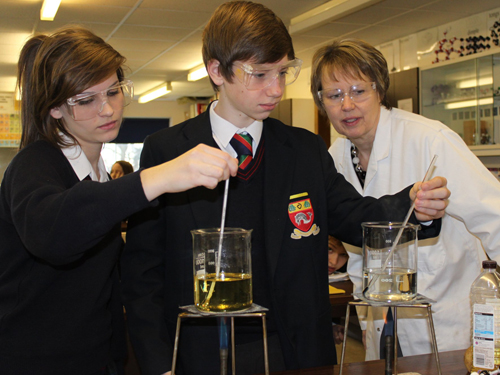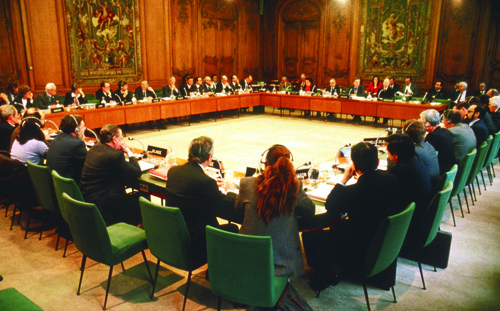
A fascinating new study reveals that students want more input in their education and specifically on the relevance of testing. The Make Assessment Matter study underscores that students and teachers place less relevance on high stakes accountability assessments but agree that tests are helpful when they are meaningful to individual learning and useful to classroom instruction in K-12 education. The study also reveals that major gaps persist in teacher assessment literacy and in some cases, that alarmingly different student perceptions exist about the value of assessment based on gender, age, racial, ethnic and family income. Finally, students and educators saw a positive impact in technology-based testing.
Joining me today in The Global Search for Education to discuss the key findings of Make Assessment Matter: Students And Educators Want Tests That Support Learning, are Matt Chapman, President and CEO of NWEA (Northwest Evaluation Association), Kelly Goodrich, Director of Policy and Advocacy of NWEA, and Peter Grunwald, President of Grunwald Associates.
Matt, please briefly outline the goals of this study.
As the country begins to implement common standards, and the dialogue around the purpose, frequency and delivery of testing has become increasingly heated, we sought to uncover the perspectives of students, teachers and district administrators.
We were very interested in examining the perspectives of students, whose opinions are often unsought and unheard in the development and implementation of educational policies. What we found was both surprising and, we feel, critical to consider as we move forward in developing learner-centered systems at the local, state and national level.


Peter, one concern about testing has been that test prep “interferes with learning”, i.e. teachers and students become too focused on prep for “tests” which is ultimately detrimental to “learning” time. How did the study define “assessments that are student-focused and used to improve learning”?
We didn’t further define “assessments that are student-focused and used to improve learning” in the study. Our study findings indicate that students and teachers find less value or relevance in high-stakes accountability assessments that are largely used to measure aggregate student performance across states and districts, evaluate educators and programs, and compare groups of students. Students do want to know how they are doing as individuals–whether they are meeting learning goals that are important to their education now and in their futures. They want to know what they can do to improve. Teachers want assessments to provide this same information about students and about their own teaching practices. Students and teachers both want timely, actionable results from assessments. And students look to their teachers to help them monitor their progress and for help with their learning.
In our view, assessments that are student-focused and used to improve learning respond to these student and educator priorities. Student-focused assessments are tightly connected to learning expectations, the curriculum and teaching–and relevant to individual students. Such assessments are an integral part of instruction as it is happening, not just afterwards, to gauge student understanding during teaching moments.
Student-focused assessment also means that students receive assessment results they can understand when there is still time to put them to good use. Teachers also should work with students to use assessment results to set learning goals. And teachers should have time to collaborate with their peers to interpret assessment results and use them to adjust and differentiate instructional practices based on identified student needs. In other words, student-focused assessment has built-in feedback loops: students are assessed in the course of learning, students and teachers receive quick, actionable results, and these results serve constructive purposes to improve learning.
Kelly, students clearly want to have a voice on assessment and their education. How do you propose we engage students in the decision-making process going forward?
I’d suggest talking with more students – including elementary, middle and high school students – on how they want to be engaged in these important discussions. It is vital to remember that the data that we are discussing is actually student data – students should have a voice in how their own data is used.
At a state level, perhaps state education leaders could establish a representative panel of students to engage when legislation or new policies are being discussed and planned.
On a federal level, perhaps educational assessment organizations and businesses could support a team of students to travel to Washington to help them engage with Congress and policy leaders on specific legislation and policies.


Matt, assessment literacy for teachers – clearly your study identified a problem here. What is the biggest gap you found and how would you solve the problem?
We found that teachers are very savvy when it comes to using assessments to inform instruction. According to our data, the vast majority of teachers are using assessment results to adjust instructional strategies (74%), plan and differentiate instruction for high, average, and low-performing students.
However, we did identify some gaps among educators in the understanding of the different types and purposes of assessment and as well as broad agreement in the need for more pre-service preparation in assessment and time for professional collaboration around assessment results.
We see a need to provide teachers with more pre- and in-service time and resources, and more time for collaboration to maximize the benefit they can gain from assessments in their practice.
Peter, did you do any research on frequency of testing – what works? What is considered too much?
We did not ask respondents specifically about the frequency of testing. We did find, however, interesting trends around the perspectives of the amount of time spent on testing. In 2011, 28 percent of teachers and 29 percent of district administrators believed that students spent “just the right amount” of time on assessments. In 2013, despite the intense national dialogue on this subject, those numbers show marked increases for both groups–38 percent for teachers and 48 percent for district administrators.
However, there are disparities about time spent preparing for and taking different kinds of assessments, with teachers (70 percent) and district administrators (55 percent) saying in 2013 that the focus on state accountability tests takes too much time away from learning.


Kelly, why do you think a larger percentage of African American, Asian and Hispanic students believed state accountability tests are very important to their futures compared to just 47 percent of white students?
This is a compelling finding. As to why this is, that was beyond the purview of this survey, but clearly points to an opportunity for the education research community to explore the issue in greater depth. Understanding the reasons for this may well help us unlock greater outcomes for all students.
Kelly, what steps need to be taken to expand technology readiness in every district?
Students and teachers let us know in their survey responses that they see a silver lining in the struggles to implement technology in the classroom, especially for delivering assessments. The early efforts, while not perfect, have allowed us to see the positive impact of technology based assessments – faster test delivery, faster delivery of results, greater student engagement – to name a few.
While additional funds are probably required, perhaps we can make this work more efficiently by establishing new metrics that really demonstrate school readiness for technology and new devices, beyond just Internet access. When we have clear information on what is needed, we can better prepare a plan that defines resources and goals.
This work will likely require partnerships – perhaps between very different organizations – to fund and support the implementation of this important change to our K-12 classrooms.
For more information on the Make Assessment Matter study: http://www.nwea.org/makeassessmentmatter


All photos are courtesy of NWEA
In The Global Search for Education, join me and globally renowned thought leaders including Sir Michael Barber (UK), Dr. Michael Block (U.S.), Dr. Leon Botstein (U.S.), Professor Clay Christensen (U.S.), Dr. Linda Darling-Hammond (U.S.), Dr. Madhav Chavan (India), Professor Michael Fullan (Canada), Professor Howard Gardner (U.S.), Professor Andy Hargreaves (U.S.), Professor Yvonne Hellman (The Netherlands), Professor Kristin Helstad (Norway), Jean Hendrickson (U.S.), Professor Rose Hipkins (New Zealand), Professor Cornelia Hoogland (Canada), Honourable Jeff Johnson (Canada), Mme. Chantal Kaufmann (Belgium), Dr. Eija Kauppinen (Finland), State Secretary Tapio Kosunen (Finland), Professor Dominique Lafontaine (Belgium), Professor Hugh Lauder (UK), Professor Ben Levin (Canada), Lord Ken Macdonald (UK), Professor Barry McGaw (Australia), Shiv Nadar (India), Professor R. Natarajan (India), Dr. Pak Tee Ng (Singapore), Dr. Denise Pope (US), Sridhar Rajagopalan (India), Dr. Diane Ravitch (U.S.), Richard Wilson Riley (U.S.), Sir Ken Robinson (UK), Professor Pasi Sahlberg (Finland), Professor Manabu Sato (Japan), Andreas Schleicher (PISA, OECD), Dr. Anthony Seldon (UK), Dr. David Shaffer (U.S.), Dr. Kirsten Sivesind (Norway), Chancellor Stephen Spahn (U.S.), Yves Theze (Lycee Francais U.S.), Professor Charles Ungerleider (Canada), Professor Tony Wagner (U.S.), Sir David Watson (UK), Professor Dylan Wiliam (UK), Dr. Mark Wormald (UK), Professor Theo Wubbels (The Netherlands), Professor Michael Young (UK), and Professor Minxuan Zhang (China) as they explore the big picture education questions that all nations face today.
The Global Search for Education Community Page
C. M. Rubin is the author of two widely read online series for which she received a 2011 Upton Sinclair award, “The Global Search for Education” and “How Will We Read?” She is also the author of three bestselling books, including The Real Alice in Wonderland, is the publisher of CMRubinWorld, and is a Disruptor Foundation Fellow.
Follow C. M. Rubin on Twitter: www.twitter.com/@cmrubinworld






Recent Comments